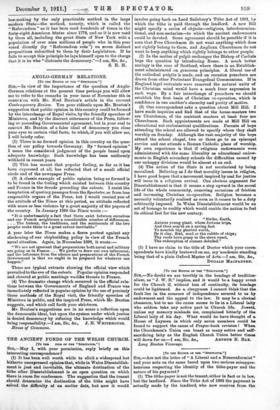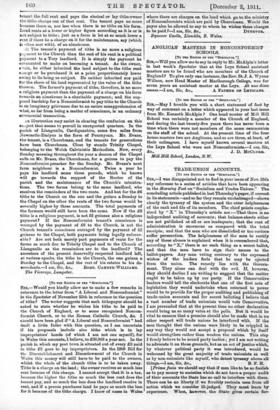[To THE EDITOR OF THE "SPECTATOR "]
SIR,—Are not the letter of "A Liberal and a Nonconformist" and your note on the same based upon two serious misappre- hensions respecting the identity of the tithe-payer and the nature of his payment (1) The tithe-payer is not the tenant, either in fact or in law, but the landlord. Since the Tithe Act of 1892 the payment is actually made by the landlord, who now receives from the tenant the full rent and pays the clerical or lay tithe-owner the tithe charge out of that rent. The tenant pays no more because there is, nor less when there is no tithe on his farm. Land rents at a lower or higher figure according as it is or is not subject to tithe ; just as a farm is let at so much lower a rent if there be a charge on it for the maintenance, say (which is often met with), of an almshouse.
2) The tenant's payment of tithe is no more a religious payment to the Church than the rest of his rent is a political payment to a Tory landlord. It is simply the payment he covenanted to make on becoming a tenant. As the Owner, a esiin, he either inherited the land subject to the tithe rent taat ge or he purchased it at a price proportionately lower owing to its being so subject. He neither inherited nor paid for the share of his land represented by the value of the tithe thereon. The farmer's payment of tithe, therefore, is no more a religious payment than the payment of a charge on his farm towards an almshouse is a charitable payment; and the sup- posed hardship for a Nonconformist to pay tithe to the Church is an imaginary grievance due to an entire misapprehension of what, so far from being a matter of conscience, is an ordinary commercial transaction.
an illustration may assist in clearing the confusion on this suoject that seems to prevail in unexpected quarters. In the parish of Llangunllo, Cardiganshire, some five miles from Newcastle-Emlyns is the farm of Pencnycau. Mr. Evans, the tenant., is a Churchman, and the tenants for generations have been Churchmen. Close by stands Trinity Chapel, belonging to the Welsh Calvinistic Methodists. Now, every Sunday morning throughout the year a deacon of the Chapel calls on Mr. Evans, the Churchman, for a guinea to pay the Nonconformist preacher for the Sunday. Mr. Evans's next farm neighbour is a Nonconformist.. Twice a year he pays his landlord some three pounds, which he knows will go towards the support of the Rector of the parish and the maintenance of the Church's ministra- tions. The two farms belong to the same landlord, who receives the remainders of the two rents. And but for the £6 tithe to the Church on the one and the guinea a Sunday to the Chapel on the other the rents of the two farms would be severally higher by these amounts. The total payments of the farmers would still have been the same. Now if the £6 tithe is a religious payment, is not 52 guineas also a religious payment? If the Nonconformist tenant's conscience is wronged by the payment of £6 to the Church, is not the Church tenant's conscience outraged by the payment of 52 guineas to the Chapel, both payments being legally enforce- able P Are not both merely part payments of rents for the farms as much due to Trinity Chapel and to the Church of Llangunllo as the remainders are to the landlord? The ancestors of the present deservedly respected landlord left, at various epochs, the tithe to the Church, the one guinea a Sunday to the Chapel, and the rest of his estates to his de-



































































 Previous page
Previous page